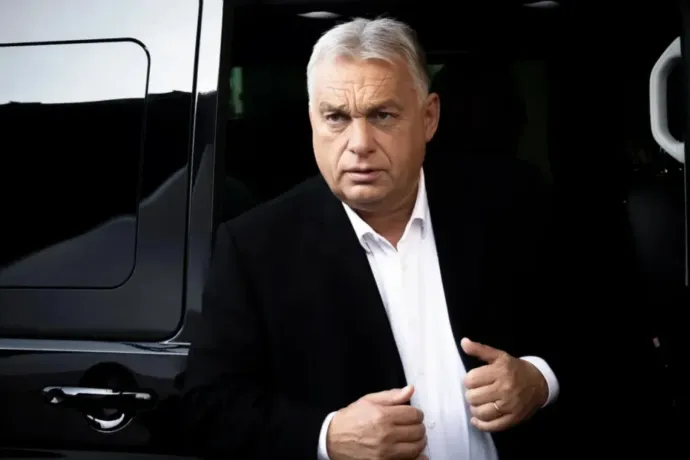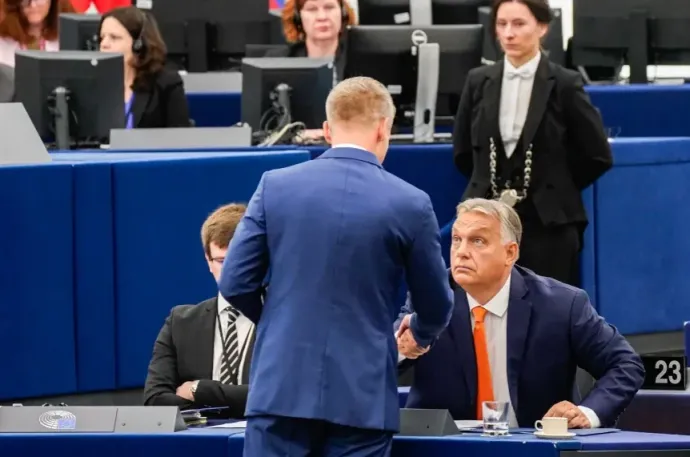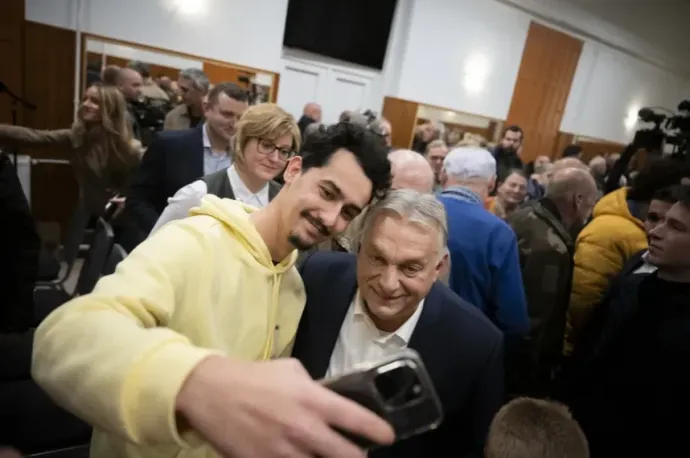Viktor Orbán sets out to put things right

After the 2022 election, which ended in another Fidesz supermajority, Viktor Orbán moved away from domestic politics and became increasingly preoccupied with foreign policy. He also tried to position himself in the public eye as an international leader who is now in the same league with the big dogs like Donald Trump and Vladimir Putin.
This was helped by the fact that his pro-Russian moves and "war of independence" against the European Union have often been the subject of much international press coverage. Orbán's speeches at the Tusványos Free Summer University and Student Camp in Transylvania also revealed that he was already thinking in terms of centuries. This year, for example, he spoke of "change in the world order", not dwelling on minor issues such as the lack of air conditioning in hospitals or the dilapidated state of the railways.
But while Orbán was busy with foreign policy, there were more and more signs that Fidesz was getting comfortable with 14 years of supermajority rule. After the clemency scandal and the weaker-than-expected election results on 9 June, there was a growing call for change in Fidesz's own circles, which is, of course, linked to the emergence and growing popularity of Péter Magyar, the political newcomer whose Tisza Party came in 2nd in the European Parliamentary elections.
"The Prime Minister is currently busy with European politics, but perhaps he should come back to Hungarian politics and put things right within Fidesz", Péter Kovács, Fidesz mayor of the Budapest 16th district, summed up the changed domestic political scene in Tusványos. These opinions seem to have reached Orbán as well, because in recent weeks he has plunged back into domestic political battles, even though there is still a year and a half to go until the 2026 parliamentary elections.
He began to talk about Péter Magyar
Orbán's long-standing strategy is never to mention his current political opponent by name, not to put him on the same level as himself. Throughout the 2022 campaign he avoided calling out by name the united opposition's joint candidate for prime minister, Péter Márki-Zay. For a long while, he did not even mention the name of Péter Magyar or the Tisza Party. However, beyond a certain point, he could not help but react to the emergence of the new challenger. Even his own supporters expected him to show strength and take up the gauntlet. Not least to give them some guidance as to what to think of the new opponent, who, moreover, is coming from among them, from within Fidesz.
Until an interview on the national radio on 11 October, Orbán only made references to the leader of the strongest opposition party. In his speech on 15 March, quoting the writer Magda Szabó, he said "we forget the traitor, the traitor is gone, he is dead, we never knew him". He also avoided saying Magyar's name at Fidesz's civic picnic in Kötcse, when asked by the press if he would debate him in the European Parliament plenary session. "I am at the disposal of all members of the European Parliament," the prime minister replied.
During the debate, Orbán then used a play on words as Magyar's name means ‘Hungarian’ to attack the leader of the opposition without saying his name. “I find what I have to say about the Hungarian (magyar) member of EPP (the European People's Party of which Peter Magyar's Tisza Party is a member) absurd. Your Hungarian (magyar) fellow EPP recently said in public that being a MEP is the biggest sham job, which is only for making money.” He went on to say that "I find it blatant that someone makes allegations of abuse as a Hungarian here, while at home he is being prosecuted for theft, and he obviously took up his mandate in the EP to hide behind his immunity."
This is how we got to the radio interview of 11 October mentioned above, where Orbán gave the Fidesz politicians the line. It went like this: Brussels has openly said that it wants to bring down the Hungarian government, and Péter Magyar is their man. Orbán continued this narrative in his unexpectedly belligerent speech on 23 October at the national holiday, in which he called Peter Magyar a "type only good to sign his name" and "Manfred Weber's puppy". Fidesz has been pushing this narrative ever since.

He has made an effort to look fit
Orbán did not only take up the rhetorical fight with Péter Magyar. In early September, the tabloid Blikk reported that the Prime Minister had gone on a diet and started working out again. There is little other way to interpret this than that Orbán is trying to demonstrate his strength and readiness to act to his followers.
It may seem frivolous to analyse the Prime Minister's physical appearance, but appearance is a highly important part of a politician's image. And we can hardly say that the 61-year-old Orbán has an advantage over Péter Magyar, who is almost 20 years younger than him. In his speech in Tusványos, Orbán mocked “liberal politicians in slim-fit outfits, drinking latte-avocado, on sugar- and fat-free diet, promoting themselves”, but for many voters, Péter Magyar, who gives a younger and more dynamic impression, may still be a more attractive choice than he, who has been in politics for more than 30 years. The leader of the Tisza Party plays up to this, regularly posting about himself while exercising and writing about the importance of healthy eating. This is also an attempt to contrast himself with Orbán, a sausage gobbler and pálinka drinker, and to reinforce the image that he is different from the Prime Minister.
Andrea Szabó, an election sociologist, also told Telex earlier that a change of scale has been apparent in Orbán's operations for some time, which she believes is most obvious in his physical appearance. "For the first time, Orbán is in a position where he is sending a message to his electorate that he is taking on his challenger by changing his physical appearance."
Júlia Sonnevend, a media researcher and associate professor at the New School for Social Research in New York, takes a similar view in her recently published book on the question of charisma and charm in politics. In an interview with the online news portal 444, she described the joint workout between the Prime Minister and Arnold Schwarzenegger as an iconic moment, because she said it clearly showed that Orbán had to react to Magyar, who was already using his body image to communicate that there is a new, alternative, younger force.
The battle between the two reminded the media researcher of the image in 1998, when Orbán, still in opposition at the time, debated with Gyula Horn, the Prime Minister of the ruling Socialist government. "The debate between Gyula Horn and Viktor Orbán in 1998 is vivid in my mind, where Orbán won visually by being the younger, more dynamic character, in contrast to Gyula Horn, who had a communist past, and who was more jaded than Orbán, and who represented the establishment."
He also took part in the roadshow
Orbán and Magyar's struggle is also taking place at another level. In parallel with the government's new national consultation on economic neutrality, Fidesz launched a roadshow. Government members and leading Fidesz politicians are holding public forums across the country to promote the government's new economic policy measures and explain why 2025 will be a fantastic year, as Viktor Orbán predicted. The aim of Fidesz's current roadshow is not to appeal to new voters, but to keep their existing voter base intact, as reflected in the themes of the roadshow. There is a good chance that people who are already in favour of Fidesz will attend these forums. For all that matters, they are the ones getting invites in their mailboxes.
Therefore, it is remarkable that Orbán unexpectedly showed up at last Tuesday's public forum in the small town of Páty, originally announced with Fidesz MEP Tamás Deutsch. According to the state news agency, Orbán delivered the usual communication panels of international topics on the benefits of economic neutrality and the government's peace efforts, however, more interestingly, he also spoke about the stakes of the 2026 elections. According to him, as we have come to expect from Fidesz, that will be huge.

Orbán's vision is that Hungary could lose everything if Fidesz loses the 2026 elections. "If we lose, we lose everything: we lose family protection, protection against migrants, economic neutrality and the cuts in public utility bills." Apart from economic neutrality, these are all measures that Péter Magyar says he would keep if he came to power. Addressing Fidesz voters as well, the leader of the Tisza Party said in his speech on 23 October that even if Orbán were to be ousted, he would not abolish, for example, the cuts in public utility bills and the annual extra ‘13th month’ pension.
The 9 June election showed that the Tisza Party siphoned off voters mainly from the traditional opposition parties, while it has not yet been able to disrupt Fidesz's core camp. This may change before the 2026 elections, especially if Magyar starts to communicate various political messages and election promises to Fidesz voters, as he did in his speech on 23 October. This could also be the reason for Orbán's unexpected appearance: Fidesz may be thinking that they have to work on their voters now, a year and a half before the election, to prevent them from defecting to Tisza. Especially now, when the economy is not doing so well. It will be worth watching to see if the Prime Minister turns up elsewhere in the coming weeks.
He entered the communication race
Viktor Orbán is in his element in situations where he can be seen as the saviour and protector of the country. This was the case during the great floods of 2013, when he spent days touring the country, talking to workers and flood experts on the dams. He was always the one anouncing how high the water levels were, and who had to do what.
However, the Prime Minister and his communications team seemed to have dozed off during the September floods, even though Orbán had given himself to flood protection with the same enthusiasm as 11 years ago. While Péter Magyar checked in from the dams in muddy rubber boots and shovel in hand, Orbán was still working on his body image, having a photo shoot with Arnold Schwarzenegger in a gym.
After an initial setback, Orban also stepped up to the plate and put on the inevitable rubber boots. His Facebook page was flooded with photos of him walking around the dams, chatting to soldiers and police officers involved in flood defences. He even replaced his profile picture with one of him walking among sandbags. The days of flood protection also showed that with the rise of Péter Magyar, Orbán can no longer remove himself from domestic political events, because his challenger is using these communication situations at least as effectively as Fidesz.

He would transform propaganda
According to press reports, Orbán is planning to overhaul government propaganda, which also suggests that the Prime Minister has started to put things in order. According to information leaked from the Fidesz civic picnic in Kötcse, the Prime Minister believes that his party's media failed to successfully reach voters in the 9 June EP elections. According to the investigative portal VSquare, the restructuring could affect the public media, the online news portal Origo, the daily paper Magyar Nemzet and the communication and media platform Megafon, which operates on billions of tay payer's HUF.
In recent weeks, there have been rumours that Mediaworks could be broken up. Themedia giant currently holds 76 titles, but might be split into several smaller and more manageable parts. This coincided with VSquare's reports, as both Origo and Magyar Nemzet belong to Mediaworks, but the company denied the news of the split. The restructuring could be justified by the fact that Péter Magyar has so far been immune to propaganda attacks, even though Megafon has burned through a lot of money to achieve this.
Opinion polls also show that the attempts to discredit Magyar have not made a significant dent in his popularity. In recent weeks, several polls have come out showing that the Tisza Party has already overtaken or could defeat Fidesz. Of course, it is worth keeping these polls in perspective, as the 2026 elections are still a long way off, but the trend is clear: the next year and a half could be a year and a half of competition between two major parties.
For more quick, accurate and impartial news from and about Hungary, subscribe to the Telex English newsletter!